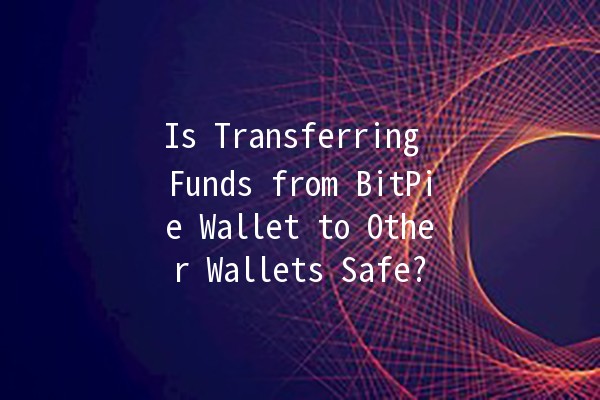
The rise of cryptocurrencies has led to an increase in the number of digital wallets, each offering unique features and security measures. One such wallet, BitPie, has gained popularity due to its versatility and userfriendly interface. However, as users look to transfer their funds to different wallets, a pressing question arises: Is transferring funds from BitPie to other wallets safe?
In this article, we will explore the various aspects of security involved in transferring cryptocurrencies from BitPie to other wallets. We will delve into practical advice and tips that can enhance your security during these transactions, as well as address common concerns and misconceptions.
Understanding BitPie Wallet
Before we discuss the safety of transferring funds, it’s essential to understand what BitPie is and how it operates. BitPie is a multicurrency wallet that supports a wide range of cryptocurrencies, allowing users to manage their digital assets in one secure location. It offers features such as:
Multicurrency Support: Users can store various cryptocurrencies, including Bitcoin (BTC), Ethereum (ETH), and many altcoins.

Userfriendly Interface: BitPie is designed for both beginners and experienced users, making it easy to navigate.
Enhanced Security Features: With an emphasis on security, BitPie provides private key management and backup options for its users.
Security Features of BitPie Wallet
BitPie employs several security measures to protect users' funds:
Factors Affecting the Safety of Transfers
When transferring funds from BitPie to another wallet, various factors can impact the safety of the transaction:
Before initiating a transfer, it's crucial to assess the security features of the receiving wallet. Ensure that the wallet implements strong security protocols, such as encryption, 2FA, and private key management. If the recipient's wallet lacks security measures, it may expose your funds to risks.
Cryptocurrency transactions depend on the underlying blockchain network. Depending on network congestion, transaction fees, and confirmation times can vary. To ensure a safe and timely transfer, it's advisable to monitor network conditions and choose optimal fee settings.
Frequent or large transfers could attract unwanted attention from malicious actors. If possible, consider breaking down larger transactions into smaller amounts. Implementing a strategy for occasional transfers can also help avoid security risks.
Your device's security level plays a significant role in protecting your cryptocurrency assets. Ensure you have uptodate antivirus software, firewalls, and secure internet connections. Lack of vigilance can result in malware infections, phishing attacks, or unauthorized access to your wallet.
Be wary of scams and phishing attempts that target cryptocurrency users. Before transferring funds, doublecheck any links, emails, or communications requesting sensitive information. Always verify the legitimacy of addresses and platforms used during transactions.
Tips for Safe Transfers
To make your transferring experience secure, consider these practical tips:
Always doublecheck the receiving wallet address before initiating a transfer. A simple mistake could lead to lost funds. Consider using QR codes for additional accuracy.
Example: If you are transferring Bitcoin, instead of typing out the address manually, scan the recipient's QR code to eliminate human error.
When transferring to a new wallet for the first time, send a small test amount first. This practice allows you to verify the address and ensure the transfer will go smoothly.
Example: If you're planning to send 1 BTC, start with a small amount (e.g., 0.01 BTC) to confirm that everything works correctly.
Consider using privacyfocused cryptocurrencies or mixing services if you want to enhance the anonymity of your transactions. This can help keep your financial activity private, reducing the chances of targeted attacks.
Example: If you're familiar with Monero or Zcash, you may use these currencies for more private transactions instead of Bitcoin.
Keep an eye on network fees before confirming your transaction. Setting a competitive fee can speed up your transaction and ensure it gets confirmed quickly.
Example: Use fee estimation tools available in your wallet or on thirdparty services to determine optimal fees based on current network activity.
Consider enabling push notifications for wallet transactions. This feature can alert you to any unauthorized transactions or changes to your account, providing an immediate opportunity to take action if necessary.
Example: BitPie offers an option to receive alerts on any incoming or outgoing transactions, helping you monitor your activity.
FAQs
Sending cryptocurrencies to the wrong address typically results in irreversible loss of funds. Since transactions are recorded on the blockchain, it is virtually impossible to recover funds sent to an incorrect address. Always take precautions to ensure address accuracy.
BitPie does not impose strict transaction limits; however, withdrawals are subject to certain requirements based on network conditions and user verification status. It’s essential to check your specific situation within the app for any limits on withdrawals.
While no system is completely immune to hacking, BitPie employs robust security measures. However, users are responsible for maintaining their device security and vigilance against phishing attempts. Practicing good cybersecurity hygiene significantly reduces hacking risks.
The decision to keep funds in BitPie or transfer them to another wallet depends on personal preferences and the receiving wallet's security features. If you are concerned about security, consider moving assets to a hardware wallet for additional peace of mind.
To ensure the security of your private keys, store them offline and in a secure location. Utilizing hardware wallets can provide an extra layer of security. Additionally, consider setting up strong passwords and enabling 2FA on wallets that support it.
Transferring between exchanges can carry certain risks, such as potential exchange hacks or downtime. Ensure the exchanges involved have a strong reputation and robust security measures in place before making transfers between them.
Transferring funds from BitPie to other wallets can be safe if you adhere to best practices and pay attention to security features. By choosing secure receiving wallets, verifying addresses, and implementing personal security measures, you can significantly minimize risks. It is vital to remain vigilant and proactive in protecting your digital assets in an everevolving cryptocurrency landscape. With the right strategies and knowledge, you can confidently manage your funds and embrace the digital currency revolution.

